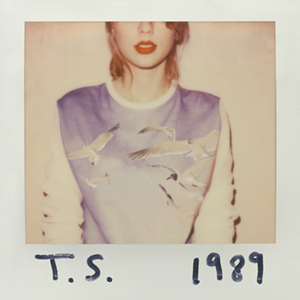Taylor Swift Breaks Up With Spotify and Sets Her Sights on Music Domination
One woman’s name has been on the tip of everyone’s tongues for the past three weeks. The country-turned-pop star, Taylor Swift, has been taking over headlines, and attempting to reroute the current state of today’s music industry.
 On October 27, the 24-year-old artist released her fifth studio album, which – by all accounts – exceeded everyone’s expectations in terms of sales. In it’s first week 1989 sold 1.287 million copies, making it the best-selling album in over a decade. Rapper Eminem was the last artist to see such high numbers back in 2002 with his album, The Eminem Show. Even with a pre-release leak, 1989 has become a rare seen force in today’s album sales.
On October 27, the 24-year-old artist released her fifth studio album, which – by all accounts – exceeded everyone’s expectations in terms of sales. In it’s first week 1989 sold 1.287 million copies, making it the best-selling album in over a decade. Rapper Eminem was the last artist to see such high numbers back in 2002 with his album, The Eminem Show. Even with a pre-release leak, 1989 has become a rare seen force in today’s album sales.
But one week later – with her songs gracing more than 19 million Spotify playlists – Swift removed her entire music catalog from the music streaming service, Spotify. Her decision has since stirred up both controversy and support for the artists’ community. She’s been called, greedy, naïve, and old-fashioned, but the decision doesn’t seem to be negatively affecting her career. In fact, on November 3, Swift became the first and only female artist to have “three albums sell over one million copies in a single week,” says Forbes.
“Taylor Swift seems pretty bullet-proof at the moment, so [pulling her catalog from Spotify] is a good move, especially if it’s intended for an industry-wide effect to make a point about artists being paid,” explains Margaret Moser, senior music journalist, commentator, and curator of the South Texas Popular Culture Center in San Antonio.
Since pulling her music, Swift has made herself something like an advocate for artists, who – aside from the top five percent – are frequently underpaid and underappreciated in the current economy.
“I’m not willing to contribute my life’s work to an experiment that I don’t feel fairly compensates the writers, producers, artists, and creators of this music,” Swift told Yahoo last week. “I just don’t agree with perpetuating the perception that music has no value and should be free.”
Though Swift is far from the image of a struggling musician – according to Forbes the crossover star was worth an estimated $64 million back in June – her actions could have a larger effect on the artist community. “Swift can give a voice to musicians who are actually struggling, which I think is admirable,” says Nina Hernandez, a music journalist for The Austin Chronicle.
Though Hernandez admits she has mixed feelings on Swift’s Spotify move, she also notes that: “Lesser known artists, like New York’s Homeboy Sandman, who don’t sell nearly as many records [as Swift], resent Spotify for essentially giving their music away for free, but have no real outlet to express that to the mainstream.” In theory at least, Swift is also speaking for these smaller artists.
Yet Swift is not the first celebrity to contest Spotify’s paying practices. Beyoncé has also withheld her latest album from the streaming service, as have the Black Keys. And considering 1989’s selling success, Moser believes Swift will not be the last artist to remove herself from the streaming site. “We’ll see similar moves. But, unless those artists have the kind of devoted fanbase who would honor a request not to view or download leaked tracks or videos, they will not be effective.”
Swift’s Climb to the Top
Since 2006 and the release of her debut album, Swift – and her record company, Big Machine Records – have been making intelligent (read: profitable) business decisions. Forbes’ June listing was the artist’s fifth time appearing on the magazine’s Celebrity 100 list. But that’s not to say she hasn’t worked for it.
In an interview with NPR, Bill Wedre (former editor of Billboard Magazine) referred to Swift as the hardest working celebrity in music. She’s managed to stay relevant for the past eight years, and she’s also managed to stay likable. Even before she “crossed over” people respected her for writing her own songs, and making arguably real connections with her fans.
In fact, a huge part of Swift’s business focus – and subsequent success – has been the emphasis placed on her relationship with her fans. For her latest album, the singer hosted a secret listening party for a horde of her Twitter followers. Blogger Sammie Carter told the LA Times that fans were contacted via Twitter, and given a meeting spot, time, and password. Those selected were then invited into Swift’s home for a sneak peak at 1989, plus homemade cookies, and a dance party.
While a touching display of fan appreciation, Swift’s private party also breeds fan loyalty. Presumably, this is why fans chastised people for listening to 1989’s illegal Internet leak before the album dropped.
In additional preparation for 1989’s release, Swift joined forces with Target to create an exclusive offer only available to Target shoppers. A week prior to the album’s release, the retailer premiered a 30 second commercial featuring a previously unheard clip of 1989’s “Style.” The commercial also informed fans that the album’s deluxe version would be sold at Target stores alone. Featuring three additional songs plus several voice memos from Swift, the deluxe edition isn’t even available on iTunes.
The marketing prowess behind 1989 seems to have paid off. Within the first two days, Target had sold 247,000 copies of the album – more than eight times the amount of records sold at Walmart. Within the week, Swift’s album became 2014’s first platinum record – and the only album to sell more than a million copies this year other than the Frozen soundtrack, which was technically released in 2013.
Streaming Versus Buying
“Streaming in general is taking off right now, and changing the way people consume and pay for (or don’t pay for) music,” explains Hernandez. Since the turn of the millennium, record sales have continued to plummet; and in the last year even iTunes sales have seen a steady drop in numbers. To many, we’ve officially entered the streaming age, whether we like it or not.
“Streaming has irrevocably changed how we listen to music much the way the transistor radio, Walkmans, and iPods did when they came out and made music portable and personal,” explains Moser.
Artists like Swift, however, are attempting to push back against streaming with the hope of returning to the days of hard copy albums. Unsurprisingly, the “retro days” of CDs were more lucrative for pop stars. Streaming – though it does pay decently, as Spotify CEO Daniel Ek detailed in a recent press update – does not pay as well as buying full-length albums once did.
Though, going back to pre-streaming times seems nearly impossible. Today, Spotify boasts 40 million users. Approximately 33 percent of those users are paying for the streaming site’s premium service. “In the old days, multiple artists sold multiple millions every year. That just doesn’t happen any more; people’s listening habits have changed – and they’re not going to change back,” wrote Ek. “Here’s the overwhelming, undeniable, inescapable bottom line: the vast majority of music listening is unpaid. If we want to drive people to pay for music, we have to compete with free to get their attention in the first place.”
Ek also adds that “top artists,” such as Swift are likely to earn more than $6 million a year for working with Spotify. As one anonymous source, at a similar streaming company put it, “the artists help us and listeners by letting us stream their music, and, in return, we help the artists with exposure.” Coincidentally, Swift did not remove her music from other streaming sites. Pandora, Beats Music, Rhapsody and Tidal still offer music from her four previous albums.
At the end of it all, Swift’s decision to leave Spotify is ultimately part of her own personal marketing goals. As long as she continues to grow her audience and reach out to her fans, she’ll surely weather the streaming storm. For now, the singer’s career seems to be smooth sailing. However, Moser – who’s been covering the music industry for nearly 40 years – suggests that Swift might come up against bumpy roads in the future. “Her biggest challenge will be remembering who she is five years down the way when she and Miley Cyrus are trying to stay relevant the way Lady Gaga is scrambling now.”
But with so many tricks up her sleeve, Swift just might be able to hold on to herself throughout all of pop culture’s ups and downs.
Photos courtesy of Wiki Commons: Eva Rinaldi (Swift feature) & Patrik Ragnarsson (Daniel Ek photo, bottom left), and HFPA/Golden Globes
19TAGS: music women in music
 Effective Communication
Effective Communication Women Making History
Women Making History Grants & Funding Sources
Grants & Funding Sources Interview Prep
Interview Prep Impactful Leadership
Impactful Leadership Dressing for Work
Dressing for Work Dressing for Your Style
Dressing for Your Style Interview Style Tips
Interview Style Tips Women's Stocking Stuffers
Women's Stocking Stuffers Gift the Busy Traveler
Gift the Busy Traveler Airport Layover Activities
Airport Layover Activities Traveling & Eating Healthy
Traveling & Eating Healthy Travel Like a Boss Lady
Travel Like a Boss Lady The Dual California Life
The Dual California Life Gifts for Thanksgiving
Gifts for Thanksgiving Summer Reading List
Summer Reading List Top Leisurely Reads
Top Leisurely Reads New Year, New Books
New Year, New Books Life Lessons from a Sitcom
Life Lessons from a Sitcom Oprah, Amy or Amal?
Oprah, Amy or Amal?














